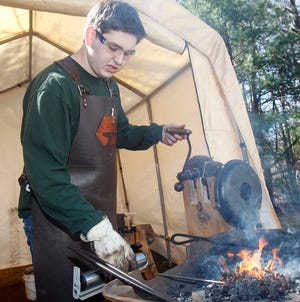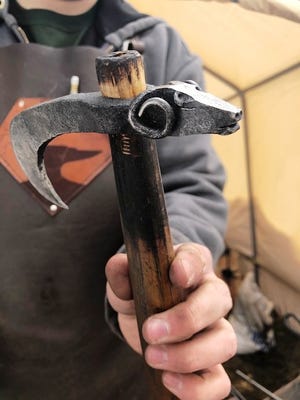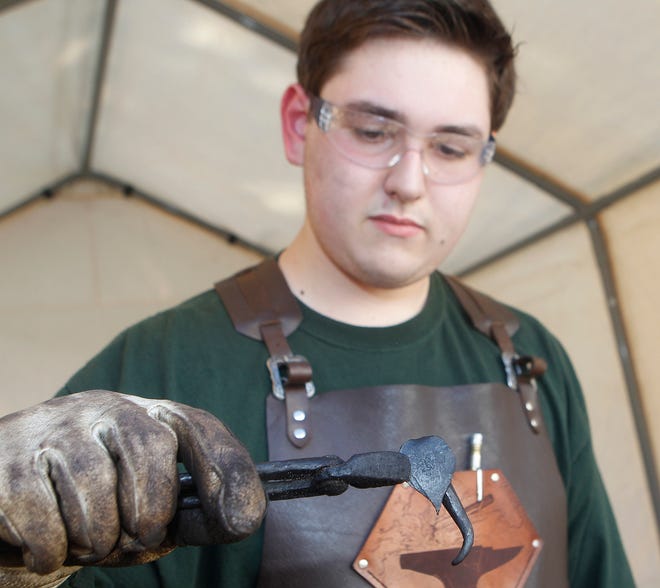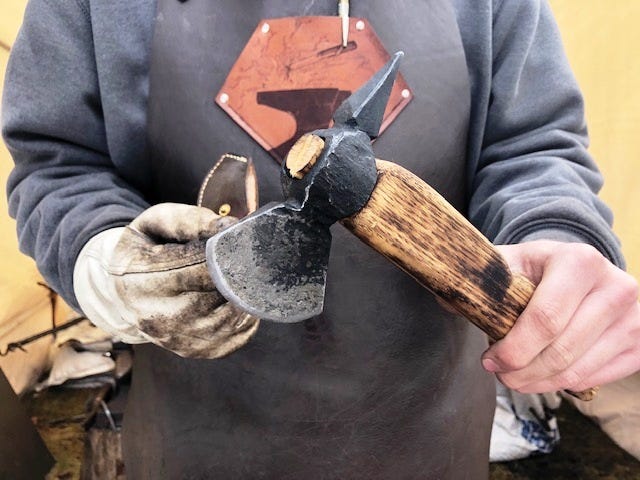Bellingham teen builds home forge, starts blacksmith shop
BELLINGHAM — CLANG, clink, clink, CLANG, clink, clink.
The rhythmic sound of steel on steel reverberates off bushes outlining the yard of a home set again from Bellingham’s Lake Avenue. A haze of white smoke drifts amongst frothy clumps of needles on pine branches.
Then, a pause within the metallic ringing. A woodpecker doing its personal hammering someplace within the woods. A second of fowl twitterings and final fall’s dried leaves rustling.
Underneath the dome of a big tent, open on one facet to free air, Nicholas Riolo lifts the squared-off metal rod he is been hammering and examines the purpose he has crafted. For a second, he slowly turns the rod between thickly gloved fingers earlier than tipping his chin ever so barely in a gesture of dissatisfaction.
At 17, the self-taught blacksmith insists he has “barely scratched the floor” of the ability. However he has developed a eager eye.

For Riolo, the endeavor is greater than only a passing curiosity. He spends numerous weekend hours plying his commerce within the yard of his household’s home, and has began his personal enterprise: Riolo Iron and Leather-based.
Exiting the tent, he thrusts the pointed rod right into a steel basin crammed with scorching coals and concurrently turns the crank of a turn-of-the-Nineteenth-century blower that sends a stream of air into the cauldron from beneath. Flames rear up among the many coals. He shifts them round with a shovel, pilling them over the top of the rod.
“It is a stable gasoline forge,” he explains as he waits, whereas clad in an extended leather-based apron, for his iron to get again to a super-heated state that he can work with. “I am utilizing bituminous coal. It is a gentle coal that burns pretty clear. It is also known as ‘smithing coal.'”
Whereas some blacksmiths use propane, Riolo says he prefers “the normal stuff.”

“I wished to maintain all of it electrical energy free and hold it as conventional as I may,” he says.
The forge the teenager makes use of is all home-built, utilizing many vintage items he has been gathering over the past two years — from the blower to the vintage anvil and vintage blacksmithing instruments he makes use of to form his creations. The anvil, he proudly notes, “is a London sample anvil with a wrought-iron physique and a metal face.”
He would not skip a beat as he offers the fireplace extra air and turns the rod he is working with, all whereas speaking about his forge.
“You’ve an air provide, forge fireside and the fireplace pod, which is the very middle of it. Then you definately construct the fireplace up as huge as you want,” he says. “With this one, It most likely will get someplace as much as possibly 2,500 levels Fahrenheit most.”

Riolo removes the rod — now glowing-red scorching — from the warmth and rapidly shifts to his spot contained in the tent. Taking on his hammer, he faucets it on the anvil — a second’s contemplation — whereas inserting the heated finish of the rod on the flat high. Then he continues with the shaping.
CLANG, clink, clink, CLANG, clink, clink.
Between every strike, he faucets the hammer on one facet of the anvil and turns the rod. The tapping in between strikes, Riolo says, “is one thing blacksmiths do to maintain rhythm.”
“Simply hitting away at it would not work,” he elaborates as he continues to work.
The rod he is working with at this second will develop into a hearth poker.
“I’ve performed quite a lot of fireplace pokers,” Riolo shares, once more lifting the pointed finish of the rod to look at it. The tip has cooled considerably and has misplaced its inner glow — that occurs in a short time — however this time the work will get a nod. The craftsman is glad.
Water hisses as he dips the working finish right into a bucket of water.

The poker, when accomplished, will be a part of a rising stock of things he’ll promote; the younger blacksmith has already bought a variety of the helpful instruments. He makes quite a lot of different gadgets as properly, together with wall hooks and nails. And he is customary his personal replicas of historic axes and knives — together with a krumkniv, or viking kitchen knife — crafting the steel elements in his forge and creating handles from vintage instrument handles.
“I would love to start out making instruments as properly,” says Riolo.
When he began, a poker took him as much as two and a half hours to craft. Now it takes about an hour, relying on how sophisticated the design is.
“When you get into that rhythm, you are able to do it lots sooner,” he says.
Then, if he is promoting the merchandise, he’ll dip it in linseed oil, which supplies it “a gorgeous end.”
A junior at Norfolk County Agricultural Excessive Faculty in Walpole, the place he research plant sciences, Riolo has all the time been drawn to conventional expertise.
His journey into blacksmithing was sparked by an curiosity in bush craft, in addition to in vintage instruments. He had a draw knife that is used to carve and strip wooden and thought to himself, “I may most likely make that.”
And so he did.
His father, Craig Riolo, is consistently amazed by his son’s pursuits.
“Out of the blue, he grew to become all in favour of blacksmithing,” he says, watching his son’s work. “It is one thing that is very completely different.”
Usually, the elder Riolo remarks, “you’ll suppose you had been speaking to an 80-year-old” when interacting along with his son. And Nicholas’ work ethic impresses his father.
“On weekends, he comes out right here within the again yard early within the morning and he is out right here all day,” Riolo says. “He is a really outdated soul. I am unable to clarify it.”

Nicholas Riolo says he simply loves crafting issues by hand. He finds it satisfying to hone one thing that’s uncooked and untamed into one thing that’s each fantastically crafted and humbly helpful.
“Each single a part of this craft is an artwork, and it’s a must to excellent every half,” he says.
One piece he’s significantly happy with is a railroad spike crafted right into a tomahawk with a ram’s head on one finish that acts as a counterweight.
Historically, Riolo would have been apprenticed for a few years to a grasp blacksmith. In a contemporary twist on that custom, he is realized quite a lot of what he is aware of from on-line analysis and asking questions of training blacksmiths on Fb.
There’s one thing in regards to the historical past of the craft that fires his curiosity, and his creativeness.
“This craft is 3,500 years outdated,” Riolo says with apparent reverence for the traditional ability he’s studying.
He goes on to notice that “you do not have to be sturdy,” essentially, to do blacksmithing. It’s, primarily, an artwork.
“It is extra than simply brute drive. You must take into consideration what you are doing,” he says.
And the probabilities are quite a few.

“I’ve this 5 1/2-inch spherical, and I could make 200 various things out of it,” Riolo says. “It is simply creativity.”
A part of the problem he faces is buying the uncooked supplies, as a result of “there will not be lots of people who do that nonetheless.”
The coal is sourced from a mine in Pennsylvania and Riolo will get it from a provider in Braintree. He will get a few of his metal from a provider in Worcester. He’s additionally grateful for the supplies given to him by native businessmen — John Kauker of Antron Engineering & Machine in Bellingham, and Eduardo Amaral of Amaral Industries in Bellingham.
“They’ve helped me out with supplies,” reminiscent of scrap and cut-offs, Riolo says.
Being of the self-sufficient type, he makes a few of his personal supplies utilizing conventional strategies. For instance, he has collected pine pitch from the forest and combined it with beeswax to create Cutler’s Resin to mount knife handles. And he is made his personal dye from sloughed-off birch bark, which he makes use of within the different craft he practices: leather-based working.

The 2 crafts usually go hand in hand: A chunk made within the forge may require a leather-based protecting or deal with. He is made his personal leather-based sheaths, and just lately made a scabbard for a buyer’s household heirloom bayonet.
Riolo hopes to construct a store with a chimney and a piece bench to exchange the tent set-up he has now. And, all the time, he is engaged on stock to supply on the market. He’ll take customized orders, too.
Whereas he presently has no plans to enter blacksmithing professionally, Riolo says he intends to maintain it going as a “facet factor.” Both means, he really enjoys the work.
“I simply love doing it,” he says, “as a result of I’ve the liberty of constructing mainly no matter I can think about. I could make absolutely anything I would like. There’s a lot you are able to do. It is countless.”

To see examples of Nicholas’ work, or to order an merchandise, go to his Fb web page @RioloIronAndLeather, e mail rioloironandleather@gmail.com, or name 774-210-9323.

